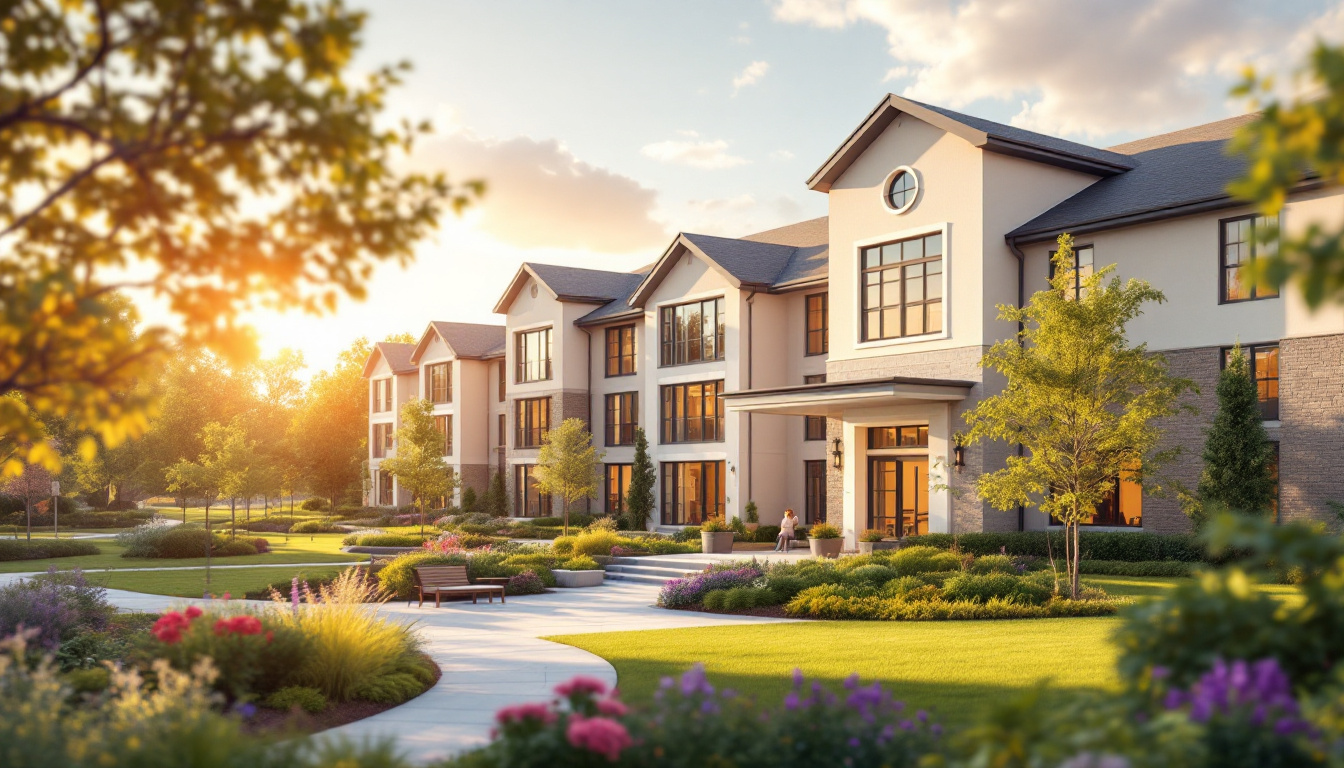How to Find Senior Care That Provides Comprehensive Care for Seniors with Multiple Conditions
Navigating Senior Care for Complex Needs: A Comprehensive Guide

Understanding Comprehensive Senior Care
Caring for seniors with multiple health conditions requires a careful balance of medical expertise, personal support, and accessible resources. Whether navigating complex healthcare needs or ensuring emotional and social well-being, finding appropriate senior care is essential. This article explores various types of senior care facilities, programs like PACE, and how specialized geriatric care and financial strategies can ensure comprehensive care for elderly individuals.
Exploring Senior Care Facilities and Services

Variety of Senior Care Facilities Available
When it comes to senior care, there are numerous facilities tailored to meet the diverse needs of older adults. These options include:
- Assisted Living Facilities: Provide support for daily activities while maintaining a level of independence.
- Nursing Homes: Offer 24/7 medical care for those with significant health needs.
- Memory Care Units: Specialized care for individuals with Alzheimer's and related dementias.
- Adult Day Care Services: Safe environments for social engagement during the day.
- Continuing Care Retirement Communities (CCRCs): Various levels of care in one location, which allows seniors to age in place.
- Board and Care Homes: Smaller facilities focusing on personal care but not extensive medical services.
Services Provided by Senior Care Facilities
Senior care facilities typically offer a variety of services, including:
- Personal Care Services: Aid with daily activities like bathing, dressing, and grooming.
- Healthcare Services: Access to nursing care, medication management, and rehabilitation services.
- Social Activities: Opportunities for engagement and interaction with peers.
- Meal Preparation: Nutritional support that addresses dietary needs.
- Transportation Assistance: Helping seniors attend appointments or social events.
Choosing the Right Care Facility
Selecting an appropriate care facility involves several considerations:
- Needs Assessment: Determine the level of care required based on health conditions and daily assistance needed.
- Facility Atmosphere: Assess the environment, ensuring it promotes safety and comfort.
- Staff Qualifications: Look for trained staff with experience in geriatric care.
- Financial Options: Evaluate costs and payment options to ensure they align with budgets.
- Location: Proximity to family and friends can enhance emotional support.
What is the Most Requested Support Service for the Elderly?
Some of the most in-demand services for seniors include:
- Personal Care: Assistance with daily activities.
- Medication Management: Ensuring medication is taken correctly.
- Nutrition and Meal Support: Providing healthy meals.
- Mobility and Transportation: Helping seniors get around safely.
- Healthcare: Access to medical services and treatments.
- Money Management: Assistance with financial responsibilities.
- Safety and Security: Ensuring a safe living environment.
- Social Interaction Opportunities: Promoting social engagement.
The Impact of Geriatric Care and Specialized Services

Role of geriatricians in senior care
Geriatricians are specially trained medical doctors who focus on the unique healthcare needs of older adults. They are proficient in managing complex health issues, particularly for individuals grappling with multiple medical conditions. By coordinating care with other health professionals, geriatricians ensure that seniors receive comprehensive support tailored to their specific needs, which can help prevent harmful medication interactions and improve overall functional outcomes.
Benefits of specialized senior care services
Specialized services, such as memory care, palliative care, and therapeutic programs, play a crucial role in enhancing the quality of life for seniors. These services are designed to cater to specific health challenges, such as cognitive impairments or chronic illnesses, providing structured and supportive environments. For instance, memory care units deliver personalized programs that focus on cognitive stimulation, ensuring safety for those with conditions like dementia.
Coordination of care for seniors with multiple conditions
Effective coordination of care is vital for seniors managing various health issues. Programs such as the Geriatric Evaluation & Management Program (GEM) facilitate a collaborative approach, enabling healthcare professionals to develop personalized care plans encompassing medical, physical, and social needs. This approach minimizes fragmentation of care, ensuring that older adults receive well-rounded support to thrive in their daily lives.
| Aspect | Importance | Example |
|---|---|---|
| Geriatricians | Manage complex health matters | Medication management |
| Specialized services | Enhance quality of life and safety | Memory care programs |
| Coordination of care | Ensure comprehensive support | Geriatric Evaluation & Management (GEM) |
In-Home Care Solutions for Seniors

Advantages of Home Care Services
Home care services offer seniors the opportunity to age in place while receiving personalized assistance in the comfort of their homes. This approach allows for greater independence, often reduces feelings of isolation, and can enhance overall quality of life. Moreover, home care minimizes the risk of infections that can occur in communal settings like nursing homes or assisted living facilities.
Types of Home Care Services Available
The range of home care services is diverse and can be tailored to meet individual needs. They typically include:
- Skilled Nursing Care: Medical services provided by licensed professionals, often related to managing chronic conditions or rehabilitation.
- Home Health Aide Services: Support with daily living activities such as bathing, dressing, and grooming.
- Physical Therapy: Professional therapists help with rehabilitation and recovery from injuries or surgeries.
- Personal Care Services: Non-medical assistance that may include companionship and help with household tasks. With the right services, seniors can receive comprehensive support catered to their unique health conditions.
Considerations for Selecting Home Care Providers
When choosing a home care provider, it's essential to conduct thorough research. Look for agencies with good references and check for any complaints filed against them. Additionally, consider the specific health needs of the senior individual, the qualifications of the caregivers, and whether the services offered align with their needs. It's also advisable to review insurance coverage options, as Medicare typically covers only certain home health services, which may require out-of-pocket expenses for additional support.
Programs PACE: Comprehensive Care for Frail Seniors
Overview of the PACE program
The Programs of All-Inclusive Care for the Elderly (PACE) is designed for seniors who require a higher level of care while aiming to keep them in their own communities instead of nursing homes. PACE provides an array of medical and social services tailored to support the unique needs of frail, elderly individuals. In essence, it creates a safety net that encompasses healthcare, socialization, and daily living assistance.
Eligibility and services offered by PACE
To be eligible for PACE, participants must be 55 years or older, reside in the service area of a PACE organization, and qualify for nursing home care, although they must be able to live safely in the community. The program offers a range of services, including:
- Medical care: Regular check-ups and specialist visits.
- Social services: Opportunities for engagement and support.
- Rehabilitation services: Physical and occupational therapy.
- Personal care services: Assistance with daily activities like bathing and dressing.
Benefits of enrolling in PACE for seniors
Enrolling in PACE comes with numerous benefits. Seniors receive coordinated care from an interdisciplinary team of health professionals, ensuring seamless management of their health conditions. This approach not only provides access to comprehensive medical care tailored to each individual, but it also fosters social interaction and community support. As a result, it empowers seniors to maintain their independence longer while ensuring their health and well-being, ultimately enhancing their quality of life.
Financial Strategies for Accessing Senior Care

Funding Options for Different Types of Senior Care
Accessing senior care can often pose financial challenges for families and individuals. Understanding the various funding options available is critical. Some major avenues to explore include:
- Private Pay: Utilizing personal savings or receiving financial support from family members.
- Long-Term Care Insurance: Insurance policies specifically designed to cover care costs for assisted living or nursing facilities.
- Reverse Mortgage: A strategy that allows seniors to convert part of their home equity into cash, which can be used for care expenses.
- Veterans Aid: Financial assistance programs for eligible veterans who require help with senior care.
Medicare, Medicaid, and Other Financial Resources
Medicare and Medicaid are crucial for many seniors navigating healthcare expenses:
- Medicare: Primarily covers medical expenses for seniors aged 65 and older, but does not cover long-term care costs associated with assisted living facilities.
- Medicaid: A state-specific program that can provide health coverage for low-income seniors, including some assistance with long-term care costs. Eligibility varies by state.
- Supplemental Security Income (SSI): Offers financial assistance to qualifying low-income seniors, which can help cover essential living costs.
Planning for Long-Term Care Costs
When planning for potential long-term care, it’s essential to consider future expenses:
- Create a Budget: Anticipate possible care needs and related costs to effectively allocate resources.
- Research Options: Understanding the costs associated with various care facilities or in-home services can guide financial planning.
- Long-Term Care Insurance: Investing early in long-term care insurance can mitigate expenses later in life.
What are some ways to pay for assisted living if you have no money?
There are several ways to finance assisted living even if you have limited funds:
- Private Pay - Using personal savings or assistance from family.
- Long-Term Care Insurance - A policy that helps cover the costs.
- Reverse Mortgage - Utilizing home equity to pay for care.
- VA Benefits - Veterans may qualify for financial assistance.
- Medicaid - Provides coverage for eligible low-income seniors.
- Medicare - Covers medical expenses for seniors over 65.
- Supplemental Security Income (SSI) - Offers financial assistance to qualifying seniors.
- Life Settlements - Selling a life insurance policy for a lump sum that can be used for care.
By exploring these funding strategies and planning ahead, seniors and their families can better prepare for the financial aspects of senior care.
| Funding Strategy | Details | Eligibility Criteria |
|---|---|---|
| Private Pay | Personal savings or family support | No specific criteria |
| Long-Term Care Insurance | Insurance to cover assisted living costs | Depends on policy terms |
| Reverse Mortgage | Home equity conversion for care payments | Homeowners aged 62+ |
| VA Benefits | Aid for veterans needing care | Veteran status |
| Medicaid | Coverage for low-income seniors | Income and asset limits vary by state |
| Medicare | Medical expenses for seniors | Age 65+ |
| Supplemental Security Income (SSI) | Cash assistance for low-income individuals | Must meet income limits |
| Life Settlements | Selling life insurance for liquid funds | Policy ownership |
Planning and Preparing for Senior Care

Importance of early planning for senior care
Planning for senior care is crucial, especially as 70% of individuals over the age of 65 will require some form of long-term care. Early planning helps families navigate options and ensures that care can be tailored to specific health needs, preventing rushed decisions during crises. By understanding available resources, families can identify services such as in-home care, assisted living, or skilled nursing facilities that best fit their loved one’s requirements.
Steps to evaluate and select senior care options
- Assess Individual Needs: Identify health conditions, daily living requirements, and personal preferences.
- Research Care Options: Explore local resources such as adult day care, home healthcare, or residential facilities, considering the scope of services offered at each.
- Financial Planning: Understand the costs involved, including insurance coverage through Medicare and Medicaid, and budget for potential out-of-pocket expenses.
- Visit Facilities: If considering residential care, visit potential facilities to evaluate their environment and services firsthand.
Utilizing referrals and research strategies for informed choices
Seek referrals from family, friends, or healthcare professionals. Utilize online resources and reviews to gauge community feedback about specific care services. Investigating each option thoroughly, including checking for any complaints against agencies, can aid in making an informed decision. Good research not only enables informed choices but also provides peace of mind for both seniors and their families.
Managing Health Conditions in Senior Care Settings
Active management of chronic conditions in seniors
Seniors often face multiple chronic health conditions, and effective management is vital for their quality of life. Home health care services play a crucial role in assisting with medication management, wound care, and physical therapy. By providing personalized home care, seniors can receive the support necessary to manage illnesses such as diabetes or heart disease, ensuring they maintain their independence and well-being.
Benefits of coordinated care approaches
Coordinated care for seniors often involves an interdisciplinary team of health professionals who work together to provide comprehensive care. Through programs like the PACE (Programs of All-Inclusive Care for the Elderly), frail elderly individuals can access medical and social services tailored to their needs. This approach helps prevent hospitalizations and allows seniors to remain in the community, emphasizing the importance of organized care.
Tools and programs to enhance senior health outcomes
There are several tools and programs that enhance health outcomes for seniors. For instance, emergency medical alert systems allow seniors living independently to access urgent help when needed. Additionally, telemedicine brings healthcare consultations directly to seniors’ homes, facilitating timely medical interventions.
| Program/Tool | Purpose | Benefits |
|---|---|---|
| Emergency Medical Alert Systems | Provide immediate assistance in emergencies | Enhances senior safety and peace of mind |
| Telemedicine | Allows remote consultations and treatment | Increases access to healthcare for homebound seniors |
| PACE Program | Offers coordinated medical and social services | Supports seniors in community living |
What happens to senior citizens when they run out of money?
When senior citizens run out of money, they often face significant challenges in accessing basic needs such as housing, home care services, and daily assistance, which can severely impact their quality of life. Although they may qualify for programs like Medicare and Medicaid, these services may not fully cover all their necessities. Financial insecurity can arise despite the overall benefits of aging, revealing the disparities in financial preparedness among seniors. Many may struggle to find adequate support, which can lead to increased stress and health issues. Therefore, it is crucial for seniors to have a plan for their financial future to ensure their well-being in later years.
Choosing the Right Comprehensive Care
Identifying and selecting comprehensive care for seniors with multiple conditions involves understanding diverse care options, assessing available programs, and planning for future needs. By exploring tailored facilities, in-home care solutions, and financial strategies, families can ensure their loved ones receive the right balance of medical and personal support. Armed with knowledge about programs like PACE and the expertise of geriatric care professionals, caregivers can better navigate the complex landscape of senior care and contribute positively to the quality of life of their elderly family members.
References
- Services for Older Adults Living at Home | National Institute on Aging
- Program of All-Inclusive Care for the Elderly - Medicaid
- Long-Term Care Facilities: Assisted Living, Nursing Homes, and ...
- Long Term Care Options for Seniors in 2024 - SeniorLiving.org
- Healthy Aging and Senior Care - Banner Health
- Senior Care Options: 3 Types of Services Explained
- Home Care Services for Seniors: Aging in Place - HelpGuide.org
- Understanding the Different Eldercare Options | U.S. News







































































































